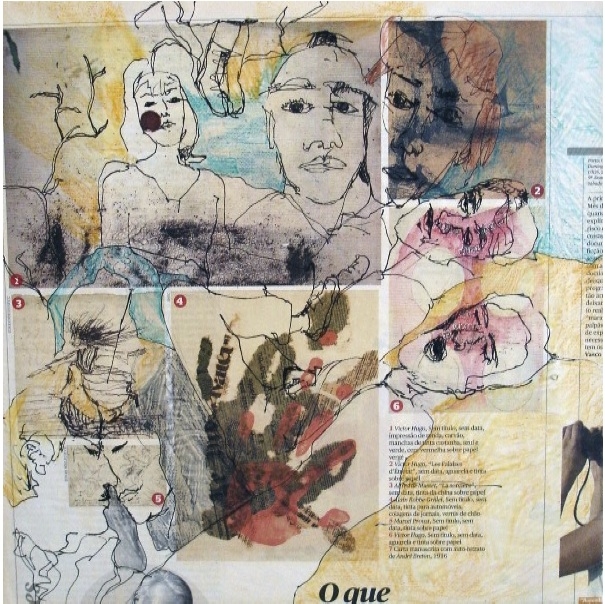(please scroll for English)
Uma das características de grande parte da arte contemporânea é poder ser entendida tanto por via da experiência como pela teoria. Olhar para o trabalho da Joana Gonçalves implica senti-lo e, não pedindo participação aos visitantes de um modo convencional, pede um tempo que já não estamos habituados a dar a imagens.
Em Ruptura (2013), Joana Gonçalves desenvolve uma ideia muito presente na realidade social e política actual, a necessidade de mudança. Seria fácil enquadrar o trabalho de Joana Gonçalves na história da arte, no tema que remete para a arte activista de mudança social dos anos 70 e, na forma que nos leva até às experiências pictóricas que desafiam a fronteira com a escultura de artistas como Frank Stella (1936). Apesar desta facilidade em enquadrar Ruptura (2013) na história da arte, aqui trata-se de uma reflexão sobre o momento actual.
Num momento em que as manifestações populares se multiplicam em pedidos de mudança, de ruptura para um novo começo, Joana Gonçalves vem reforçar a ideia de que a arte tem um papel social, seja como manifestação ou como reflexão. Para alguns sociólogos, é no caos se consegue a ordem e é nesta ideia que se desenvolve o trabalho de Joana Gonçalves. A questão sobre a arte poder ou não mudar a sociedade é longa e mantém-se por responder. No entanto, ao entrar na sala de pequenas dimensões do Round The Corner, repleta de pinturas em que a ruptura é uma constante, é fácil perceber que a arte tem, de facto, um papel de mostrar uma multiplicidade de perspectivas da realidade em que vivemos. Cabe-nos agora, reflectir sobre o que fazer perante essa realidade: Rompê-la e criar uma totalmente nova? Observá-la e criticá-la passivamente? É nestas questões que Ruptura (2013) assenta desenvolvendo-se na premissa de que a destruição do que existe implica a construção de algo novo, seja qual for a sua forma e potencial de construção de uma nova História.
In Ruptura / Rupture (2013), Joana Gonçalves develops an idea which is very present in the current social and political reality, the need for a change. It would be easy to frame Joana Gonçalves's work in the History of Art, in the theme that could be part of activist art of the 1970s, or in the form that takes us to the pictorial experiences challenging the boundaries with sculpture as seen in Frank Stella (1936). Despite the ease of framing Apesar desta facilidade em enquadrar Ruptura / Rupture (2013) in the History of Art, here the focus is on reflecting the present moment.
In a moment when popular manifestations multiply in requests for changes, in ruptures for new beginnings, Joana Gonçalves reinforces the idea that art plays a social role, be it as manifestation or as perception and reflection. The question if art has the power to change society remains to answer and evolves multiple questions and possible answers. Nevertheless, upon entering the small room of Round The Corner, filled with paintings where rupture is a constant, it is easy to understand that art has, in fact, a role of showing a multiplicity of perspectives of the reality where we live in. It is now up to us to think about what to do with reality: to make a rupture and make a new one from scratch? to evolve it? to observe and criticise it passively? It is on these questions that Ruptura / Rupture (2013) founds its basis, evolving under the premiss that to destroy implies building something new, no matter its form and potential for making a new History.
Round The Corner Rua Nova da Trindade, Portas 9F – 9G Lisboa, Portugal
